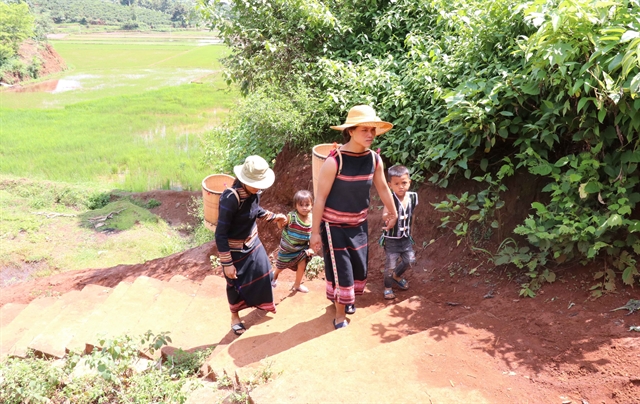 Society
Society


|
| People of Jrai ethnic minority group in the Central Highlands province of Gia Lai. —VNA/VNS Photo Hồng Điệp |
HÀ NỘI — A socio-economic census among 53 ethnic minorities in Việt Nam will be carried out by the General Statistics Office (GSO) and the Committee for Ethnic Minority Affairs (CEMA) starting Monday.
GSO deputy director general Nguyễn Trung Tiến said that the census holds great significance in defining the national statistical indicator systems, which will serve as the foundation for socio-economic development policies for ethnic minority areas in the 2026-2030 period.
The GSO and CEMA conducted two similar censuses in 2015 and 2019.
Surveys will be carried out from July 1 to August 15 this year in 54 cities and provinces across the country.
Enumerators will go door to door, directly collecting data on demographics; education; migration; marriage; health insurance; employment; pregnancy history and use of contraception among the female population aged 10 to 49; as well as information on the deceased; housing and living conditions; residential and production land; main types of livestock; and access to public services.
The census will also take into account commune-level People’s Committees through information on the commune’s specific features; use of electricity, roads and traffic; schools and teacher qualifications; common cultural houses; health and sanitation; markets and industrial zones; qualifications of commune-level public officials and employees; religions and beliefs; as well as mobile and internet coverage.
The criteria for sample sizes have also changed, with eligible localities defined as where ethnic minorities account for at least 15 per cent of the total population, instead of 30 per cent in the previous rounds of the census.
GSO deputy director general Tiến said that a majority of these locations are in remote areas with dispersed populations, making it challenging for data collection.
With the direct surveys conducted in 45 days, local statistic offices have worked on careful personnel selection and training, prioritising those with a high sense of responsibility, good expertise and digital literacy (for computer-assisted personal interviewing, or CAPI).
They must also have a good understanding of ethnic minority cultures and the areas they are assigned.
Significant efforts are also given to communication towards ethnic minority groups so that they understand the purpose and meaning of the census and provide accurate, complete and updated information to enumerators.
“The survey results will be promptly processed to ensure credibility and accuracy, serving as important insights for the Party and the state to promulgate suitable policies for rapid and sustainable socio-economic development policies for ethnic minority areas for the 2026-2030 period, leaving no one behind,” said Tiến. — VNS




